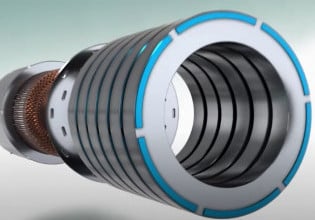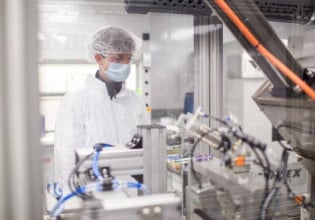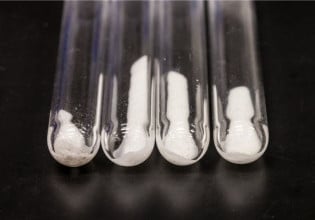Argonne Lab Announces Li-ion Battery Technology That Stores 30% More Energy; Commercialization Agreement With Japan’s Toda Kogyo
The U.S. Department of Energy’s Argonne National Laboratory and Toda Kogyo Corp. of Japan have reached a world-wide licensing agreement for the commercial production and sales of Argonne’s patented composite cathode materials for lithium-ion batteries, which are said to result in longer-lasting, safer batteries for hybrid-electric vehicles, cell phones, laptop computers and other applications.
"Our agreement with Toda Kogyo is an important step toward bringing to market key advanced lithium-ion battery technologies that are being developed here at Argonne with funding from the U.S. Department of Energy," said Gary Henriksen, Manager of the Electrochemical Energy Storage Department at Argonne. "The technologies being licensed will enhance the performance, life and inherent safety of lithium-ion cells compared to those that employ the cobalt-based cathode technology that has dominated the market since the introduction of lithium-ion batteries in 1990."
The family of structurally integrated composite cathode materials being licensed uses a new combination of lithium/manganese mixed metal oxides in what is described as a revolutionary materials-design approach to extend the time between charges, increase calendar life and improve lithium-ion cell safety.
The new cathode materials are comprised of a composite matrix using an inherently stable inactive lithium-metal oxide that is integrated with a highly active form of another lithium-metal oxide component. It is claimed that this composite allows for greater levels of lithium to be used, while reducing oxygen-induced side reactions at the electrode surface that limit cell life and safety. It is further claimed that the enhanced stability of these materials allows the system to be charged to higher voltages, leading to a significantly higher energy storage capacity than currently available materials through both the higher voltage and higher capacity per unit weight of active material.
"We are very enthusiastic about the impact of Toda’s commitment to manufacture and market these technologies through the license." said Steve Ban, Director of Argonne’s Office of Technology Transfer. "We believe the near-term commercial use of these materials and other battery technologies developed at Argonne will provide broad benefits to users of batteries containing the advanced materials and prove the value of closely linking research in basic battery science to applied R&D efforts in the area, as is the approach here at Argonne."
"We are eager to expand our existing battery material product portfolio with Argonne’s technology, and happy to do so through this agreement," said Andy Jazdanian, Manager of Toda America Inc.. Kenji Ogisu, President of Toda Kogyo’s Internal Energy Solutions Co., added, "We believe the high-capacity NMC (lithiated nickel-manganese-cobalt oxide) technology we are commercializing are the materials of the future, that will solve many of the performance issues we see today in lithium-ion batteries."
In addition to plants in Japan, Toda recently acquired a plant in the Detroit area that will help Toda serve U.S. automobile manufacturers. Toda Advanced Materials Inc. in Sarnia, Ontario, Canada produces cathode materials and their precursors for lithium-ion and nickel metal hydride batteries with a combined annual production capacity of 4,000 metric tons.






